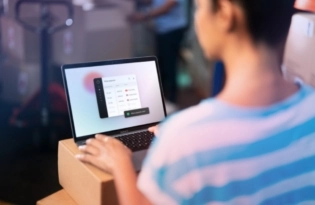In the last few years, Brazil has seen steady growth in the gig economy. So much so that there are now more than 25 million self-employed people working there.
The trend is largely due to a combination of factors. From company closures caused by the Covid-19 pandemic to rising unemployment and economic uncertainties, difficult circumstances have caused many Brazilians to seek alternatives to the more traditional form of employment. To understand where this trend is currently at, we surveyed over 500 Brazilian freelancers to feel the pulse of the industry and understand how they plan to achieve growth over the next 12 months.
As our findings show, despite the challenges of language barriers and lack of familiarity with international markets, 83% of Brazilian freelancers have, or plan to, start offering their services to new countries. France and Germany are seen as particularly attractive target markets.
With new countries to export to, and 46% already noticing a big spike in demand in the last 12 months, it is encouraging to see that 90% of Brazilian freelancers are optimistic about the future of an industry which is clearly on the rise.
Key takeaways
- 83% of Brazilian freelancers have, or plan to, started offering their services to new countries.
- 49% have seen a big spike in demand in past 12 months.
- Portugal, France and Germany are the most popular countries for exporting services to.
- 68% have had to learn new skills to offer their services to other countries.
- The biggest problems Brazilian freelancers face when exporting their services are 1) Accounting and regulatory knowledge (46%), 2) Language (43%), 3) International market knowledge (43%), 4) finding new clients (42%).
- 90% are optimistic about their business in the next 12 months.
The Brazilian freelancing trend
The Covid-19 pandemic posed great challenges for millions of workers worldwide, and Brazilians were no exception. At one point, and for the first time ever, over half of the working-age population was unemployed.
This presented several opportunities for those who had lost their jobs as thousands of Brazilians sought out new ways to make a living using their existing skill set. While the freelancing trend had already begun several years earlier, many thousands more seized the moment to join the industry.
So much so that 72% of Brazilian freelancers point to the Covid-19 pandemic as having had the biggest impact on their business, followed by 43% who say economic uncertainty has had an influence, and 27% cite political uncertainty. With current inflation running at a 26-year high and the cost of living rising at alarming rates, maintaining and growing a freelance business has become a new and persistent problem.
As a result of these challenges, Brazilian freelancers have felt the need to look overseas in search of broader opportunities and escape the downward pressures impacting their business domestically. That’s why 83% have already, or plan to, start offering their services to new countries.
While many global freelancers have worked across borders for many years already, Brazilian freelancers are at an earlier stage in their journey.
What’s more, when there aren’t many countries, or potential clients, that speak Portuguese, it’s not surprising that the most popular country they have begun offering their services to is Portugal. Interestingly, though, 35% of freelancers have begun exporting to France and 25% to Germany.
Explaining the attractiveness for Brazilian freelancers to reach out to German companies is the fact that for the past hundred years there has been a large German migration to Brazil. This has had a positive impact on cooperation between the two counties. In addition, since 2008, Brazil and Germany have also enjoyed a strategic partnership with cooperation spanning various industries such as the environment, science and research, business and trade, labour and social affairs. This cooperation has lead Brazil to now be Germany’s primary trading partner in Latin America and over 1,600 German businesses are said to have now invested in the country. Brazil’s second language is also German, spoken by almost 2% of the total population.Regarding France, Brazil has enjoyed an elevated strategic partnership with France since 2006 and the two countries now cooperate across a wide range of industries, from defence to education. So much so that there are now around 890 French companies operating within Brazil, including 38 of the 40 largest publicly traded companies on the Paris Stock Exchange. There are also over 100,000 Brazilians residing in France.
The challenges of new markets
But exporting services to new markets is not without their challenges. This has inhibited Brazilian freelancers in working further afield and 43% point to the language barrier as one of the biggest challenges when working for foreign clients. According to some, only 1% of the Brazilian population can speak English fluently, and only 5% can speak it to a competent level. This poses a problem for Brazilian freelancers as it those who can speak English can command much higher salaries.
Knowledge of foreign countries’ accounting and regulatory practices is also a factor, as 46% consider this aspect of working for foreign clients problematic. And of course, finding new clients is also difficult when you’re in a very different time-zone, as noted by 42% of our respondents.
To overcome these challenges, Brazilian freelancers have needed to adopt a growth mindset. This is reflected by the fact that 68% have had to learn new skills when offering their services to new foreign clients.
The future is bright
With new markets in their sights, though, there is a strong sense of optimism from Brazilian freelancers who are confident their businesses will, despite everything, be able to weather the economic conditions and political uncertainty they are facing. This is reflected by the 90% of respondents who say they are optimistic about the future of their business over the next 12 months.
Some final words
Brazilian freelancers are concerned about domestic economic and political uncertainties. It’s no wonder, then, that 83% have already, or plan to, start selling their services to new countries in order to maintain and grow their businesses.
While there are challenges that await them, notably a lack of linguistic, administrative and general international market knowledge, 90% remain highly optimistic, proactive, and hopeful in achieving growth. As a result, there is no doubt that the rise of the Brazilian freelance industry will continue as strongly as it has already. Indeed, Brazilian freelancers are only just getting started.
How Payoneer can help
If you’re a Brazilian freelancer, Payoneer is your go-to partner for managing all your cross-border business payments.
From multi-currency receiving accounts that enable you get paid from international marketplaces to paying your contractors or requesting payments from your global clients, Payoneer has a whole suite of tools to help.
Open an account today and see how easy, fast, and low-cost managing your business payments can be.
Related resources
Latest articles
-
Made in India for the World: The State of Indian Cross-Border eCommerce
The Indian eCommerce market has grown significantly in the last few years. As a result, many cross-border businesses have undergone a fast-paced digital transformation and contributed to surpassing the government-set $400 billion target of trade within a single year.
-
Defying the odds: How Ukrainian businesses thrive during war
One year post-war, Ukraine’s businesses adapt and thrive amidst adversity. Entrepreneurs showcase resilience, reflecting national tenacity. Many diversify, venturing into e-commerce and digital realms. Despite hurdles, 44% of SMBs aim for growth, with 36% hiring. Their grit underscores Ukraine’s enduring spirit amid challenges.
-
An 8-point Checklist for Finding the Best Payment Provider
There’s huge potential to expand into ASEAN markets. But only for online sellers that accept local payment methods. Finding a trusted payment solution can be a worry and a challenge. Use this checklist to vet potential payment partners. With the right payment support, the sky’s the limit!
-
How to bill your international clients
Want to learn how to bill international clients when you’re based in the Philippines? In this article we spoke to three leading business owners who shared their tips to working successful international work. Learn how they collect payments and more below.
-
How to nail your direct-to-consumer payment strategy
Asia-Pacific offers massive potential for DTC ecommerce. But cross-border payments can be a headache. We share an actionable strategy for DTC payments that’ll remove DTC payment hazards and expand your business with ease. What are you waiting for?
-
How to pay international vendors in order to promote profits and reduce risk
In this article, we’ll share our expert tips and best practices for paying international vendors, so you can focus on growing your business. From choosing the right payment method to navigating currency exchange, we’ve got you covered.














